Ethical AI: Exclusive Insights on Responsible Media Creation
Creating Responsibly: Ethics in AI-Generated Media
AI-Generated Media: A Marvel of Modern Technology
AI-generated media, embodying advancements in artificial intelligence, has revolutionized how content is created, shared, and consumed. From deepfakes and virtual influencers to news articles and artworks, AI’s capabilities in generating media are nothing short of spectacular. However, with great power comes great responsibility. As we increasingly incorporate AI into creative domains, ethical considerations must not only be addressed but prioritarily integrated into development and utilization processes.
Understanding the Ecosystem of AI-Generated Media
AI-generated media involves using algorithms to create content that typically requires human intelligence. This may include text, images, videos, and music, where AI systems learn from large datasets and mimic styles or generate completely new creations. Technologies like GANs (Generative Adversarial Networks) and NLP (Natural Language Processing) are commonly employed, pushing the boundaries of what machines can create.
The Ethical Dimension: Navigating the Complex Landscape
Stepping into this digital renaissance, the magic of AI throws up significant ethical dilemmas. The primary issues revolve around authenticity, privacy, and the potential for misinformation.
Authenticity and Originality: One of the pressing ethical concerns is the distinction between what is real and what is AI-generated. While AI can produce novel content, the input it learns from often originates from human-made works. This blurs lines between originality and derivative, raising questions about ownership rights and intellectual property.
Privacy Concerns: Data used to train AI systems can sometimes include personal information which should be handled with discretion and respect for privacy. The use of personal data without consent can lead to privacy infringements, making ethical guidelines paramount.
Potential for Misinformation: AI-generated content can be misused to create realistic but entirely fictional media, leading to misinformation. This poses risks in contexts like news dissemination, where trust and accuracy are fundamental.
Creating a Framework for Ethical AI Use
To harness AI’s potential responsibly, developers, users, and regulatory bodies must collaborate to establish and adhere to ethical guidelines that keep pace with technology.
Transparency and Disclosure: A fundamental step in ethical AI use in media is transparency about the use and extent of AI involvement in content creation. Informing users that what they are consuming is AI-generated helps maintain honesty and trust, especially critical in journalism and news-related outputs.
Respecting Copyrights and Intellectual Property: Implementing measures to ensure that AI respects creative rights and does not inadvertently plagiarize is crucial. This might include designing algorithms that can reference materials without violating intellectual property laws or using only data licensed for such use.
Counteracting Misinformation: Developing AI that can fact-check its outputs and providing users with tools to verify content can help mitigate the risks of misinformation. Additionally, educating consumers on the nature of AI-generated media and how to recognize it can empower them to better evaluate the content’s veracity.
Moving Forward: The Role of Continuous Dialogue
As technology evolves, so too must our understanding and frameworks for managing it. Continuous dialogue among technologists, ethicists, legal experts, and the public is essential. These discussions should not only address current ethical issues but also anticipate future challenges that might emerge.
Conclusion: Ethics at the Heart of Innovation
AI-generated media is transforming the landscape of content creation, bringing with it a host of exciting possibilities as well as significant ethical considerations. Putting ethics at the forefront of AI media generation ensures that this powerful tool enhances societal values and supports constructive advancements. Thus, while we marvel at AI’s capacity to mimic and innovate, let’s commit to guiding its trajectory with a thoughtful and responsible approach to ethics. This commitment will help safeguard our societal norms and ensure that AI serves humanity positively, reinforcing trust and enriching our creative domains for the better.





